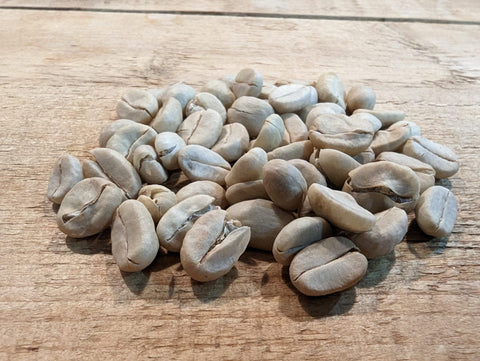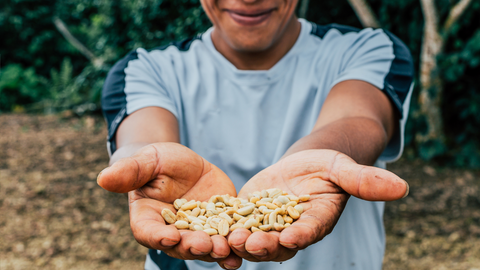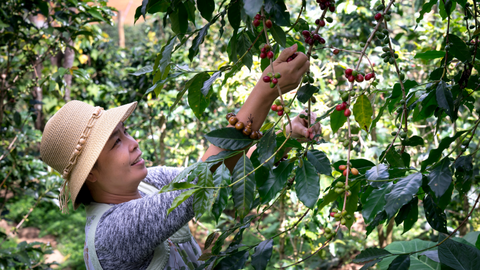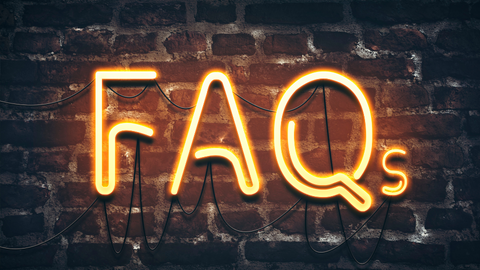Coffee Beans. Where Do They Come From?
Where do coffee beans come from, you ask? That's an interesting question, and really there's no straight answer, because it depends on specifically what you mean by "where do coffee beans come from", as the answer is different depending on the context of the question.
But don't worry, I'm going to answer this question from all positive perspectives, so whatever the reason behind your question, you'll get the answer you were looking for, and more :-).
I'll answer a slightly different but very closely related question first, as I think this info is interesting to most coffee lovers (who weren't already aware), and it helps as a foundation on which to answer the main "where do coffee beans come from" question.
What are Coffee Beans?

Meet the seed of the coffee tree, which we commonly refer to as "coffee beans". These are fresh coffee seeds ready for germinating, so this is what they look like before any kind of processing (other than being removed from the cherry) prior to roasting.
There is actually no such thing as a coffee "bean", it's a misnomer, a mistake made hundreds of years ago in identifying the seeds of the coffee cherry as "beans" because they resembled the seeds of the legume family of plants, which are called beans.
If coffee trees were part of the bean family, then yes they'd be coffee beans, but they're not, so what we've been referring to as coffee beans for hundreds of years (well, not you and I specifically as I'm sure neither of us are quite that old, but people in general) are coffee seeds.
We've been referring to them as coffee beans for so long, though, this phrases is embedded in our language, so referring to them as coffee seeds would seem very weird.
So, coffee beans are the seeds of the coffee tree. They are found inside the cherries of coffee trees.

There isn't just one type of coffee tree, by the way. Just like their are Braeburn apples, Gala apples and so on, there are various different varieties of coffee tree.
I'm not referring to Arabica and Robusta, by the way. These are different species of coffee tree, and they're not the only coffee tree species, but they're the two main commercially viable species for coffee bean (seed...) production.
What I'm referring to are the many different varieties of Arabica coffee tree, which we tend to refer to as "varietals", because it makes us sound clever :-), so when you see varietals listed as "Typica", "Bourbon" and so on, this tells you what specific coffee tree the beans came from.
Arabica beans are they the best type of coffee?
So coffee cherries are the fruit of coffee trees, and I'm calling them "trees" by the way, because that's what they are, so if you were wondering why some people call them coffee plants, it would appear that’s another coffee misnomer.
I’ve called them coffee plants in the past, and I’ve heard them being referred to interchangeably as plants or trees, or sometimes shrubs, but according to Dr. Aaron Davis from Kew Gardens, they’re trees, as reported in this sprudge article.
Where do coffee beans originate from?

OK so this is one of the possible angles that this question may be asked from, meaning that when you ask where coffee beans come from, you mean where do the originate from.
If this is what you’re looking for, then it’s widely agreed (by boffins & stuff) that the birthplace of coffee is the forests of what is now known as Ethiopia. This area has the longest known history with coffee as a drink, and an even longer history with coffee as s food.
Tribespeople of this area used to mix coffee cherries with animal fat to make small caffeinated balls of sustenance, which they wore in animal skin pouches to keep them energised on long hunting/gathering trips.
If you’re now expecting me to tell a tale of a goatherd called Kaldi or Khaldi in the 9th century whose goats nibbled some cherries & started doing backflips, leading to this chap taking these interesting tree fruits to a monk, who threw them on a fire, then poured water on the fire, and drank the result, then no, just no.
Don’t get me wrong, I know this is just a legend, but it’s quoted so often (sometimes as if it’s factual) that I find it slightly irritating.
If this really did happen, then this goatherd was very late in making his “discovery”, given that the people of that region (his ancestors, if he was supposedly from that area) had been consuming coffee cherries for a looooong time by that point.
It’s hard to know for sure, but I suspect, from what I’ve read, that the Oromo people were probably already “cooking” (what became roasting) and “crushing” (what became grinding) coffee beans by that time to make their portable energy mix, they may have even got to the brewing stage of the evolution of coffee by then.
Anyway, to answer the “where do coffee beans come from” question from the perspective of the origins of coffee, it would appear to be Ethiopia.
Where do Coffee Beans Grow

Another potential perspective for the “Where coffee beans come from” question is regarding where coffee beans come from now, i.e. where in the world is coffee currently being produced.
The answer to this is that coffee grows in what’s referred to as the “Coffee Belt” which is an area spanning the globe, running horizontally across the equator between the Tropics of Cancer & Capricorn.
If you wanted specific countries, the top ten coffee producing countries in terms of volume are as follows:
- Brazil
- Vietnam
- Colombia
- Indonesia
- Ethiopia
- Honduras
- India
- Uganda
- Mexico
- Guatemala
It’s worth pointing out that this changes if you were to filter it to species, i.e Robusta or Arabica.
For the full list see list of coffee production by country, Wikepedia.
Where Should You Buy Coffee Beans From?
Another angle that this question could be asked from, would be based on where you should buy your coffee beans, and this is a very simple question, you should by them from us! :-).
If you've not ordered from us before, you don't know what you're missing, just click on the link below :
Why should you buy from us? Mainly because our coffee tastes amazing, it's super freshly roasted (usually only a day or two from dispatch, sometimes even on the day of dispatch), and we offer a great service too.
But we are going to say that, aren't we? So let us put our money where our mouths are, and use the 25% discount code to find out.
We also believe that our website is much easier to order coffee beans from, when it come to finding the perfect coffee beans for you, because of the way our product filtering works.
On the left hand side of the website, you'll see filter boxes that you can tick, for example let's say you just want to narrow it down to the coffees that work well with any Sage espresso machine, no worries, just tick that box.
Maybe you brew manually? Just tick the relevant box depending on your favourite manual brew method, and the coffee will be sorted to show you just the coffee we think works best for your chosen brew method.
Maybe you only want organic coffee beans? Again, just tick that box, and the same is true if you only want to see Fair Trade coffee beans, blends, single origins, and specific origins.
So hopefully you'll agree that we've made it as easy as possible for you to find the best coffee beans for you, and if we haven't, just click on the chat icon at the bottom of the page, have a chat with us & let us know.
I'm not really that bothered about raindrops on roses and whiskers on kittens, but here are a few of my favourite beans:
Chocolate Brownie Blend
This has been my favourite for flat whites since I first tasted it, a stunning blend, which works brilliantly for espresso, creates rich chocolatey flat whites, cappuccino, cortado, latte etc., and it's a really forgiving bean to work with, so not tricky at all to dial in.
Want something that reminds you of an old school pudding favourite, have a look at the Bakewell Tart Peru
Bakewell Tart Peru

If you're looking for a lovely easy drinker for pourover, this is a great choice, there's a subtle hint of Frangipane, but it's not overpowering.
As espresso, Americano, long black or as an intense milky (flat white, cortado), for me it tastes as close as you could get to the taste of a Bakewell tart without actually adding a Bakewell tart to your cup, which I may just have to do at some point...
Taste is a subjective thing of course, and when we're talking about flavour notes in coffee they're usually very subtle, but for me as espresso, there's no mistaking the main flavour notes of this one.
This is a medium/dark roast, so quite a forgiving one when it comes to your setup and barista skills.
Milk Chocolate and Caramel Decaf Peru

If you think decaf tastes like dishwater, try this, you'll change your mind! We nearly called it "I can't believe it's not caffeinated" but didn't fancy being sued by Unilever ;-).
Honestly, this is a lovely coffee, which happens to be decaf. I would drink this for the taste, because it's that enjoyable, which isn't something I ever thought I'd find myself saying about a decaf.
Usually I'd think of decaf as a last resort that I'd drink because I want a coffee but it's a bit later in the day and I don't want a sleepless night, but that's not the case with this, this is a very enjoyable coffee, which happens to be decaffeinated.
Obviously we're not the only source of great quality coffee beans, we're incredibly lucky in the UK these days that there are literally hundreds of small batch roasters these days, producing mega quality coffee beans.
Most of us even have at least one roaster within our home town, and going into a roastery, especially one that has a cafe attached or locally, is a great way to source your coffee beans, as you can usually get friendly advice while you're at it.
So if you don't want to buy your coffee beans from us, that's fine, don't get me wrong, we'd love your custom, but if you decide we're not for you, just look around and you're bound to find that you have a relatively local roaster, and of course there are a huge number of roasters and specialist suppliers with websites that you can order from.
What is the importance of fresh coffee beans?
My main advice when it comes to where you get your coffee beans from, is to expect a roasted on date.
If you pick your coffee beans up from a supermarket, or from a more general website, and the bag comes with a use by date but no roasted on date, then you have no idea how old the beans are by the time you get them.
Also if you're buying from a roaster or specialist supplier who're passionate about coffee, you're likely to get much better quality beans, than the more "run of the mill" commodity coffee that you'll get from the more mainstream sources.
So, hopefully this answers your "where do coffee beans come from" questions regardless of the perspective you were asking the question from.
But in case it didn't, here are some frequently asked questions.
Where Do Coffee Beans Come From FAQs

Do coffee plants grow coffee beans?
Coffee trees grow coffee cherries, and the seeds of the coffee cherries are what we know as coffee beans.
Do coffee beans come from a tree or plant?
You'll often hear the word "coffee plant" being used, and you'll sometimes hear that coffee grows on "shrubs", but actually coffee grows on trees. Many of them are quite small trees, which I think is why they're often called plants or shrubs, but technically speaking they're trees. So, money might not grow on trees, but coffee does :-).
Is coffee first grown as a berry?
Hmm, is this a “which came first, the chicken or the egg” type question? ;-). If so, I’m not the person to answer to that, I’m not clever enough to answer such a philosophical question, which I can prove by the fact that I couldn’t find what I’d done with the cheese the other day, and then discovered that I’d put it in the cutlery drawer, instead of putting the knife back in there. Genius I am…
What animal does coffee beans come from?
What?? This is actually a predicted search on Google, which is very odd. Coffee beans do not come from an animal, they are the seeds of coffee trees. It may be that people are thinking about Kopi Luwak, or "Cat Poo Coffee", which doesn't actually come from a cat ;-).
These are beans which are processed (meaning the way the seeds are separated from the cherry flesh) by going through the digestive system of the Asian palm civet.
It's an interesting (meaning weird) concept, but I've never tried it, and never will, because I don't like the idea of any fellow being that we share this planet with, being imprisoned and force-fed one particular food just so very privileged humans who can afford to pay the price, can try it.
I know that some brands say they're free range and that there's no animal cruelty involved, but PETA don't seem to be convinced about that: Civets Suffering for Cruel Coffee.
Does coffee come from poop?
See the last question. Basically, no of course not, coffee is the seed of the coffee cherry, which grows on coffee trees.
The seeds need processing, which means to be removed from the fruit. This is usually done in processing plants where it's washed processed (which is what it sounds like) or natural processed which includes the cherries being left in the sun for a while, depending on the specific process being used.
This changes the flavour profile, washed processed coffees and naturals, produce different flavour notes.
In the wild, the Asian Palm Civet will sometimes eat coffee cherries, and since they come out at the other end without the cherry flesh, someone saw the digestion of this cute looking animal as a processing method.
It's not a particularly commercial viable processing method, it's expensive, which is why the beans are so expensive, and most importantly, it's cruel. Many poor wild Civets have been abducted and forced to live in a tiny cage and do nothing but eat one particular food (which in the wild would probably just be an occasional snack).
So don't worry, there's no way you're going to accidentally buy coffee that does come from animal droppings, you'd know about it because you'd be paying a ridiculous price for it!
Where do Arabica coffee beans come from?
In terms of the origins of coffee, Arabica is thought to originate in what is now known as Ethiopia.
When it comes to production countries, the top 10 production countries for Arabica by volume as reported by Index Mundi, are:
Brazil
Colombia
Ethiopia
Honduras
Peru
Guatemala
Mexico
Nicaragua
China
Costa Rica

